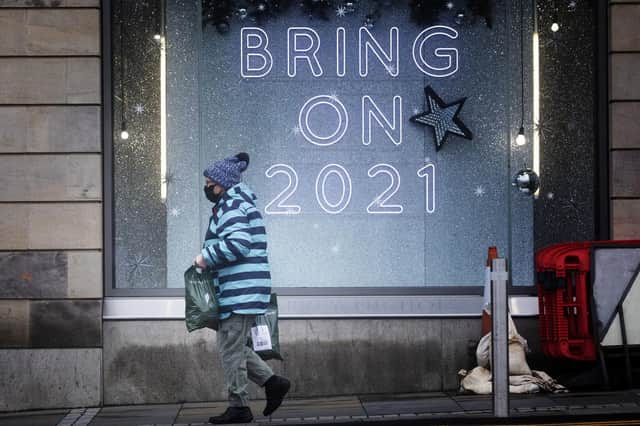No predictions please, just thank God 2020 is nearly over - Kirsty Strickland


Accompanying that verifiably cursed sentence was a photo of the Prime Minister with both thumbs up and hair which had been styled with his trademark deliberate scruffiness.
If this was a movie, a time-hopping hero would have yelled, ‘’STOP!’’ as the Prime Minister’s finger hovered above the ‘send tweet’ button. Not that it would have made any difference. In a year that has, at times, seemed stranger than fiction, the time traveller’s tale would have been judged too far-fetched to be believed. They’d have likely been escorted from the premises and put on a terror watchlist for their trouble.
Advertisement
Hide AdAdvertisement
Hide AdFor as much as I am praying that Boris Johnson doesn’t make any bold predictions about what kind of year 2021 is going to be, he is not to blame for the emergence of Covid-19. Though the same can’t be said for the mess that came after.
It has been a year that has both stopped and stolen time. Thank God it is nearly over.
If masochism is your jam, you might have reminisced about the last normal ‘thing’ you did before the quiet chaos of the first lockdown began.
Mine was a small student event I spoke at, on a panel with Nicola Sturgeon. It was pre-lockdown, but there had been some mention of this new virus that was heading our way. It was back when we’d heard the lingo but hadn’t yet bought the masks. That night, I had some antibacterial hand gel in my handbag. I valued hand hygiene long before it was fashionable and mandated in law. As the event got started, I semi-jokingly offered it to my fellow panellists. If I’d have known what a valuable commodity that stuff would become I wouldn’t have been so quick to share. If we had known why the shelves would soon be cleared of all cleaning products, the event probably wouldn’t have gone ahead at all.
As we near the end of this seismic year, looking back comes far more naturally than looking forward. After all, we tried looking ahead to the end of lockdown, then to the end of tiers and restrictions and onwards to a victorious Christmas. And look where that got us.
If we had known what 2020 had in store, would that have made it any easier to cope?
Forewarned is forearmed, as they say. But I know I’m not alone in feeling a sense of qualified relief for being none the wiser at every stage.
I’m glad that I didn’t know how long the first lockdown would last. Or that it would morph into the ugly, stop-start-stop-start we experienced during autumn and winter.
Advertisement
Hide AdAdvertisement
Hide AdSo far, the UK has seen nearly 70,000 Coronavirus deaths. That is a paralysing figure to try and process, let alone come to terms with. Perhaps that’s why the number of lives lost has slipped down the agenda, replaced with coverage of the vaccine rollout and new lockdown restrictions.
One of the challenges of the Coronavirus crisis has been finding the right words to talk about it openly. I’m aware of how daft that sounds, given we’ve spoken of little else. But the universality of 2020 has presented a stumbling block in communicating with one another in the way we do with other shared experiences.
At times, we have self-censored our own complaints and struggles for fear of them being misinterpreted by others. Moaning about the restrictions and the impact they are having on you invites others to ask why you don’t care about people dying. If you mention boredom or loneliness, well, you should count yourself lucky that you’ve got time to be bored. What about the frontline workers, risking their lives to keep the country running? And however economically damaging you’ve found the crisis, there’s always somebody who has it far worse.
All this is, of course, true. It’s also true that it can be useful to put your own woes in perspective by practicing gratitude for what you do have. Sometimes that doesn’t quite cut it though. In certain circumstances - and I think a global pandemic meets the criteria – it can be cathartic to grumble.
While we all have been impacted by COVID-19, it has also been the great divider of 2020: cleaving through the population and exposing long-standing inequality.
Those that have a garden, decent sick pay, rainy-day savings, secure employment and a comfortable place to live have experienced this year differently to those who don’t. It shows how entrenched inequality is in the UK that such a basic level of personal and financial stability is an aspirational goal, and not a universal certainty.
If there is a positive to be drawn from 2020, it is perhaps that the true reality of that has become better understood. Obviously, awareness counts for nothing without political will, but one does tend to follow the other.
Whether there will be any lasting positive change to come from this crisis remains to be seen. There’s no neat beginning, middle and end to the pandemic this year. This was a 2020 story, but its final chapters won’t be written until 2021.
Advertisement
Hide AdAdvertisement
Hide AdWhenever normality does return, it will feel strange for a while. Though given how well-practiced we have become at handling uncertainty, the adjustment period should be minimal.
Some have predicted hedonism and a summer of love. Others say that after all that has been lost, we will find a new appreciation for the ordinary. Cuddles will certainly feel more significant than they ever have before.
Will those initial months of freedom bring all the sweet relief of that first, frantic cigarette after a long plane journey? Or will it be something altogether more tentative, as we gradually re-expose ourselves to all the colour and vibrancy of the world?
I’m not sure. Those are probably questions for next year.